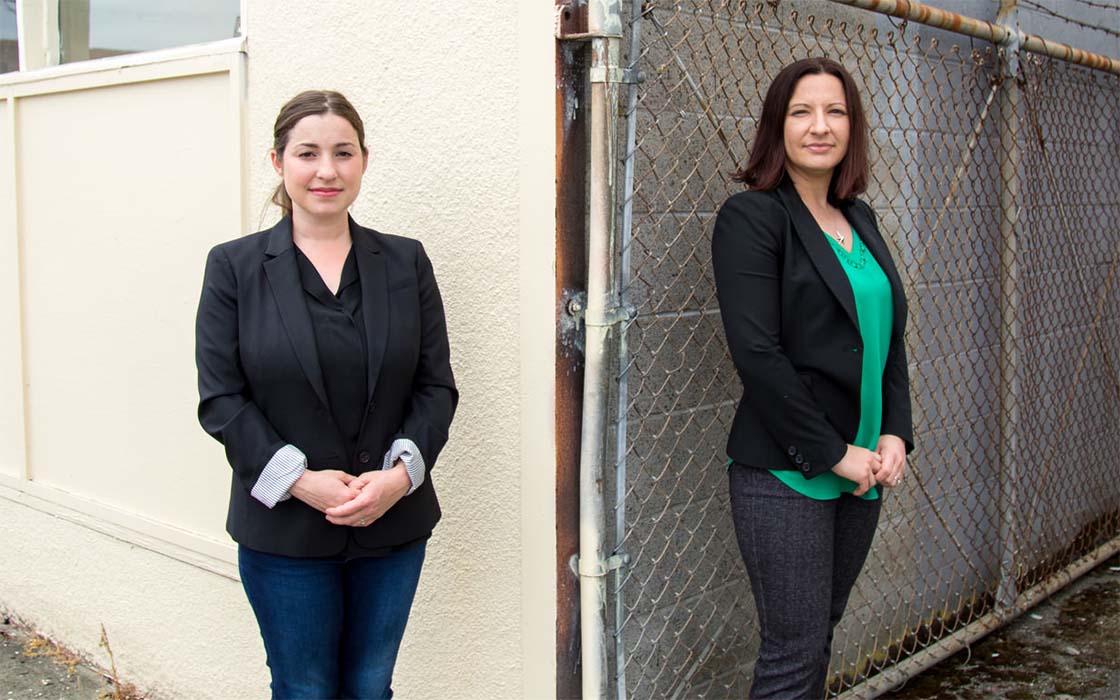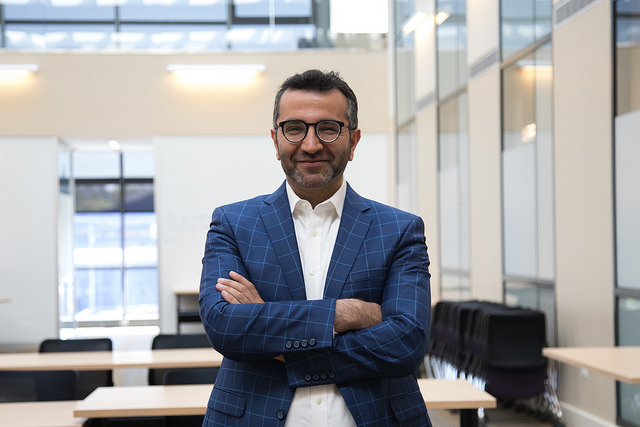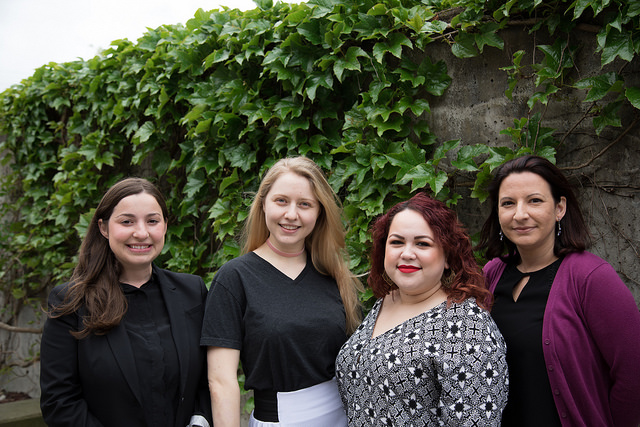
Telling Their Stories
Assistant Professors Rachel Hershberg and Vanessa de Veritch Woodside are using interviews to understand the effects of detention on immigrants and refugees in the South Sound.
Without action, the term "urban-serving" is empty. Publicly engaged scholarship brings the phrase to life.
Turan Kayaoglu, the Associate Vice Chancellor of Research and a professor at UW Tacoma, defines publicly engaged scholarship as "the collaborative co-production and exchange of knowledge through meaningful, mutually-beneficial partnerships with community members and organizations. The Collaborative Publicly Engaged Scholarship (CPES) Fund — money allocated through the UW Tacoma Strategic Initiative Fund to the Office of Research in order to catalyze use-inspired research — equips faculty at UW Tacoma to support just that.
Through a competitive proposal process, the CPES Fund resulted in six awards to faculty members working with community partners on publicly engaged research projects.

Vanessa de Veritch Woodside and Rachel Hershberg received funding from the CPES Fund. Both work as assistant professors. Their project is titled "Displacement, Detention, and Integration of Immigrants and Refugees in the South Sound."
Through their research, de Veritch Woodside and Hershberg will partner with immigration resources in the community — namely Tacoma Community House, AID NW and World Relief Seattle — to document the experiences of immigrants and refugees integrating into the community following detention.
De Veritch Woodside and Hershberg's partnership seems an odd pairing. Hershberg's scholarly background is a mix between developmental and community psychology, while de Veritch Woodside's expertise is situated in Latin American and Latinx literature and culture.
Though their academic work may stem from two different fields, their advocacy and research interests are the same. Both are rooted in a particularly vulnerable population: immigrant and refugee youth and families, including mixed-status families. “When I found out what she did I was super excited about the possibility of working with her,” Hershberg said of de Veritch Woodside.
The feeling was mutual.
Their collaboration grew organically through informal conversations with each other. De Veritch Woodside connected Hershberg to some of the community partners with whom she had already formed relationships.
Before long, they both were involved with many of the same local organizations and volunteer initiatives. “In the community we started doing things together before we started doing things academically,” Hershberg said. De Veritch Woodside agreed. “Our project stems from a natural evolution of our mutual work in the community,” she said.
After discovering the CPES Fund, Hershberg and de Veritch Woodside decided to try and formalize their shared interest in immigrant and refugee communities, writing a proposal for a program that would become one of six publicly-engaged research projects supported during the 2017-18 academic year through the CPES Fund.
Tacoma is home to the one of the largest immigration detention facilities in the country, the Northwest Detention Center, operated by the for-profit GEO Group on behalf of U.S. Immigration and Customs Enforcement. According to de Veritch Woodside, it’s not uncommon for students to be unaware of its presence. Many students were born and raised here and had no idea that the detention center is a mile and a half away from campus, she said.
De Veritch Woodside and Hershberg’s community-based project will consist of interviews with people who have either been detained at the center or who travelled to the United States without documentation but have received some form of “legal” status. Inquiries into life histories, the immigration process and resettlement experiences are among the wide array of information de Veritch Woodside and Hershberg are gathering for their research.
The point of their project is to capture a more realistic picture of what it means to be an immigrant or refugee than is typically found in depictions of the South Sound. That entails understanding how the process of becoming “legal” — through migration, detention or court proceedings — continually shapes the life of these groups.
“We’re trying to capture the experiences undocumented and previously-detained people have had becoming a part of our community,” Hershberg said. “Through our interviews, we want to find out what can we provide that will help make Tacoma a more inclusive and welcoming place for these individuals and families.”
De Veritch Woodside and Hershberg‘s qualitative interviews will feature questions from community partners providing assistance to immigrant and refugee communities in the South Sound.
“The questions that we are drafting for the interviews are written in conjunction with each of our individual community partners,” de Veritch Woodside said. “Often times, it’s difficult for these community organizations to get objective evaluation with respect to the services they provide, so our community partners would like our assistance in getting unbiased feedback.”

De Veritch Woodside and Hershberg want to tell a different side of the larger narrative on what it means to be an immigrant or refugee in the South Sound. “We want to open up the knowledge base about what these communities within Tacoma look like, because there’s such a misconception of who the undocumented or refugees are here,” de Veritch Woodside said. “We have the perception that it’s mostly Latinx individuals who are detained, but it’s far beyond that. There is such a rich diversity in these communities.”
Bridging the gap between theory and practice, the focal point of UW Tacoma’s drive to produce publicly engaged scholarship is to support the university, and its students, in addressing local issues.
“In this project, we emphasize student’s involvement in research,” Kayaoglu said. For De Veritch Woodside and Hershberg, that meant including two students — Stteffany Duran and Sophiya Boguk — in the recruiting and interviewing of participants, and in the future, in the analyzing of interviews that will be foundational to the project.
Being an urban-serving university is more than just being located in a city. It’s serving and engaging with the surrounding community. It’s investing in the welfare of the city and region. It’s co-producing publicly engaged scholarship in partnership with the very public its meant to serve.
“Our society faces a lot of issues, and as a public higher education institution, we have a mission to contribute to and engage with our communities in meaningful and lasting ways,” Kayaoglu said. “As a public institute of higher education, we have a moral responsibility to work collaboratively with the communities in which we are embedded to understand challenges and opportunities and strengthen the fabric of the community through reciprocal partnerships.”
The CPES Fund is also paving the way for five other research projects, all varying in their focus. From voice-activated reading technologies to describing and understanding pregnancy experiences of African American women in Pierce County, UW Tacoma’s publicly-inspired initiative not only allows faculty to fund their research, it’s redefining the role of public universities as well.
“We’re in an age where people do question the value of higher education,” Kayaoglu said. “I see publicly engaged scholarship as our way of responding to that. Our mission is not just to educate the next generation of doctors, scientists, teachers and community leaders, but contribute to the welfare and development of our communities.”



